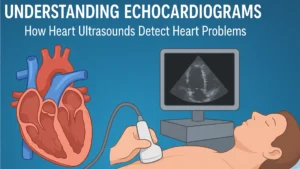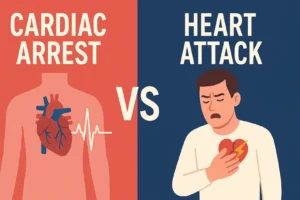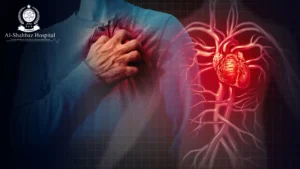Digestive health issues have become increasingly common in modern society, affecting millions of people worldwide. According to recent research, digestive diseases affect over 60 million Americans annually, with gastrointestinal symptoms being among the most frequent reasons for medical consultations. In Pakistan, gastrointestinal conditions like Irritable Bowel Syndrome (IBS) and GERD affect 33.2% and 24–35% of adults, respectively (PMC). Understanding when your stomach problems require specialized care from a gastroenterologist can make the difference between managing symptoms effectively and allowing a serious condition to progress.
A gastroenterologist is a medical specialist who diagnoses and treats disorders of the digestive system, including the stomach, intestines, liver, pancreas, and other organs involved in digestion. These healthcare professionals have undergone extensive training to identify and manage complex digestive conditions that may not respond to general medical treatment.
Stomach Problems and Digestive Health: Key Statistics and Insights
The prevalence of digestive disorders is staggering. According to the National Institute of Diabetes and Digestive and Kidney Diseases (NIDDK), digestive diseases affect millions of Americans each year. Recent global studies indicate that digestive diseases accounted for 2276.27 million estimated prevalent cases, 2.56 million deaths, and 88.99 million DALYs globally in 2019, representing a significant increase from previous decades.
Furthermore, research published in Gastroenterology reveals that more than 40% of persons worldwide have functional gastrointestinal disorders (FGIDs), which affect quality of life and health care use. These statistics highlight the critical importance of recognizing when digestive symptoms warrant professional medical attention.
5 Major Signs You Should Visit a Gastroenterologist
1. Persistent Abdominal Pain and Bloating
Abdominal pain is one of the most common digestive complaints, but when it becomes persistent or severe, it requires professional evaluation. Prolonged or persistent abdominal pain or bloating may be reasons to see a gastroenterologist, particularly if symptoms re-emerge after nearly every meal or are accompanied by nausea or painful bowel movements.
What Makes This Symptom Concerning:
- Pain that persists for more than a few days
- Severe pain that interferes with daily activities
- Pain accompanied by fever, weight loss, or changes in bowel habits
- Bloating that doesn’t improve with dietary changes or over-the-counter medications
Potential Underlying Conditions: Persistent abdominal pain can indicate various serious conditions, including inflammatory bowel disease (IBD), peptic ulcers, gallbladder disease, or even certain cancers. Early diagnosis and treatment are crucial for preventing complications and improving outcomes.
When to Act: If you experience abdominal pain that lasts more than 48 hours, intensifies over time, or is accompanied by other concerning symptoms such as fever, vomiting, or difficulty eating, it’s essential to consult a gastroenterologist promptly.
2. Unexplained Changes in Bowel Habits
Changes in bowel movements are often the body’s way of signaling that something is wrong with the digestive system. Unexplained changes in bowel habits, including diarrhea, constipation, and blood in the stool, are among the primary reasons to seek specialized care.
Symptoms:
- Sudden onset of diarrhea lasting more than a few days
- Chronic constipation not responding to dietary changes
- Blood in the stool (visible or detected through testing)
- Mucus in the stool
- Significantly narrow stools
- Alternating patterns of diarrhea and constipation
Statistical Context: According to the Centers for Disease Control and Prevention (CDC), 35.4 million visits to physician offices involve diseases of the digestive system as the primary diagnosis, with changes in bowel habits being a leading complaint.
Associated Conditions: These symptoms can indicate conditions such as:
- Irritable bowel syndrome (IBS)
- Inflammatory bowel disease (Crohn’s disease or ulcerative colitis)
- Colorectal cancer
- Celiac disease
- Infections or parasites
3. Chronic Heartburn and Acid Reflux
While occasional heartburn is common, chronic acid reflux can lead to serious complications if left untreated. Heartburn can occur after eating fatty, spicy, or acidic foods, but when it becomes frequent, it requires medical attention.
Warning Signs:
- Heartburn occurring more than twice per week
- Symptoms that don’t improve with over-the-counter antacids
- Difficulty swallowing or painful swallowing
- Chronic cough or hoarseness
- Regurgitation of food or sour liquid
- Sensation of a lump in the throat
The GERD Connection: Chronic heartburn is often a symptom of gastroesophageal reflux disease (GERD), which affects approximately 20% of the U.S. population. Left untreated, GERD can lead to serious complications, including esophagitis, Barrett’s esophagus, and an increased risk of esophageal cancer.
Long-term Implications: Chronic acid reflux can damage the esophageal lining over time, leading to scarring, narrowing, and potentially precancerous changes. Early intervention by a gastroenterologist can prevent these complications through proper diagnosis and treatment.
4. Difficulty Swallowing (Dysphagia)
Difficulty swallowing, medically known as dysphagia, is a serious symptom that should never be ignored. Persistent difficulty swallowing (dysphagia) or a steadily worsening lump in your throat requires immediate medical evaluation.
Types of Swallowing Difficulties:
- Feeling like food is stuck in the throat or chest
- Pain while swallowing
- Inability to swallow certain textures or temperatures
- Choking or coughing while eating
- Regurgitation of undigested food
Potential Causes: Dysphagia can result from various conditions, including:
- Esophageal stricture (narrowing)
- Esophageal cancer
- Achalasia (muscle coordination problems)
- Gastroesophageal reflux disease (GERD)
- Neurological disorders affecting swallowing
Emergency Considerations: Esophageal pain (esophagitis), difficulty or painful swallowing, coughing or choking while eating, regurgitation, and food impaction (food becoming stuck in the chest) are all potential signs of a problem affecting the upper part of your digestive system. If you experience complete inability to swallow or severe pain, seek immediate medical attention.
5. Persistent Nausea and Vomiting
While nausea and vomiting can result from various causes, persistent symptoms warrant gastroenterological evaluation. Ongoing or unexplained nausea or vomiting is a sign to see a gastroenterologist, as it may indicate serious underlying conditions.
Concerning Patterns:
- Nausea lasting more than 24-48 hours
- Vomiting that prevents keeping food or fluids down
- Vomiting blood or coffee-ground-like material
- Projectile vomiting
- Nausea and vomiting accompanied by severe abdominal pain
Possible Underlying Conditions: Persistent nausea and vomiting can indicate:
- Gastroparesis (delayed stomach emptying)
- Peptic ulcers
- Gallbladder disease
- Bowel obstruction
- Liver disease
- Pancreatic disorders
The Gut-Brain Connection: Research shows that dysfunction in the communication between your gut and brain, known as the gut-brain axis, can contribute to persistent nausea and vomiting. This complex relationship between the digestive system and nervous system requires specialized evaluation and treatment.
Additional Warning Signs That Require Immediate Attention
Unexplained Weight Loss
Unintentional weight loss of 10 pounds or more over a short period, especially when accompanied by other digestive symptoms, can indicate serious conditions, including cancer, inflammatory bowel disease, or malabsorption disorders.
Severe Dehydration
When digestive symptoms lead to inability to maintain adequate fluid intake, resulting in dizziness, dry mouth, reduced urination, or confusion, immediate medical attention is necessary.
Signs of Gastrointestinal Bleeding
Black, tarry stools, bright red blood in stool, or vomiting blood are signs of gastrointestinal bleeding that require emergency evaluation.
The Importance of Early Intervention
Early diagnosis and treatment of digestive disorders can significantly improve outcomes and prevent complications. According to recent studies, gastrointestinal (GI) symptoms such as heartburn, indigestion/dyspepsia, bloating, and constipation are common in the community, but their significance is often underestimated by both patients and healthcare providers.
Benefits of Timely Gastroenterological Care
- Accurate Diagnosis: Gastroenterologists have specialized training and access to advanced diagnostic tools
- Targeted Treatment: Specialized treatment plans based on specific conditions
- Prevention of Complications: Early intervention can prevent serious complications
- Quality of Life Improvement: Proper treatment can significantly improve daily functioning
- Long-term Management: Ongoing care for chronic conditions
Preparing for Your Gastroenterologist Visit
What to Expect During Your Appointment
Your gastroenterologist will conduct a thorough evaluation, including:
- Detailed medical history
- Physical examination
- Review of symptoms and their patterns
- Discussion of family history
- Possible diagnostic tests
Questions to Ask Your Doctor
- What could be causing my symptoms?
- What diagnostic tests do you recommend?
- Are there lifestyle changes that might help?
- What treatment options are available?
- When should I schedule follow-up appointments?
Documenting Your Symptoms
Keep a detailed record of:
- When symptoms occur
- What triggers them
- How long do they last
- What provides relief
- Any associated symptoms
Preventive Measures and Lifestyle Modifications
Dietary Considerations
- Eat a balanced diet rich in fiber
- Stay hydrated
- Limit processed foods and excessive alcohol
- Identify and avoid trigger foods
- Consider smaller, more frequent meals
Lifestyle Factors
- Maintain a healthy weight
- Exercise regularly
- Manage stress effectively
- Avoid smoking
- Get adequate sleep
The Role of Screening and Prevention
Regular screening is crucial for certain digestive conditions, particularly colorectal cancer. The American Cancer Society recommends regular colonoscopy screening beginning at age 45 for average-risk individuals. Early detection through screening can prevent serious complications and improve treatment outcomes.
Conclusion
Digestive health is fundamental to overall well-being, and recognizing when symptoms require specialized care is crucial for maintaining optimal health. The five major signs discussed – persistent abdominal pain and bloating, unexplained changes in bowel habits, chronic heartburn and acid reflux, difficulty swallowing, and persistent nausea and vomiting should prompt immediate consultation with a gastroenterologist.
Given that 62.8% of Americans report experiencing 1 or more frequent GI symptoms in the past 3 months, it’s clear that digestive issues are widespread and require proper medical attention. Don’t ignore persistent symptoms or assume they will resolve on their own. Early intervention by a qualified gastroenterologist can prevent complications, improve quality of life, and ensure the best possible health outcomes.
How Al Shahbaz Hospital Can Help
At Al Shahbaz Hospital GI Clinic, we offer:
Expert consultation from experienced gastroenterologists.Diagnostic tools: Endoscopy, colonoscopy, imaging, lab tests.Personalized treatment plans for IBS, GERD, IBD, ulcers, liver/gallbladder disease.Follow-up care, including dietary, psychological, and medical support. 24/7 emergency support for acute conditions.
Visit: https://alshahbazhospital.com/
Frequently Asked Questions (FAQs)
Q1: What is the difference between a gastroenterologist and a general physician for stomach problems?
A gastroenterologist is a medical specialist who has completed additional training specifically focused on digestive system disorders. While a general physician can handle basic stomach issues, gastroenterologists have specialized expertise in complex digestive conditions, advanced diagnostic procedures like endoscopy and colonoscopy, and targeted treatments for chronic gastrointestinal diseases. They can provide more comprehensive care for persistent or severe symptoms that don’t respond to general treatment.
Q2: How long should I wait before seeing a gastroenterologist for stomach problems?
You should see a gastroenterologist if stomach problems persist for more than a few days or if they interfere with your daily activities. Immediate consultation is necessary if you experience severe abdominal pain, blood in stool, difficulty swallowing, persistent vomiting, or unintentional weight loss. For chronic symptoms like recurring heartburn (more than twice weekly) or ongoing changes in bowel habits, schedule an appointment within 1-2 weeks.
Q3: What tests might a gastroenterologist perform during my visit?
Common diagnostic tests include:
- Endoscopy: Visual examination of the upper digestive tract
- Colonoscopy: Examination of the colon and rectum
- CT or MRI scans: Detailed imaging of digestive organs
- Stool tests: To check for blood, infections, or inflammation
- Blood tests: To assess liver function, inflammation markers, and nutritional status
- Breath tests: To detect H. pylori bacteria or lactose intolerance
- Ultrasound: To examine the gallbladder, liver, and pancreas
Q4: Are stomach problems more common in certain age groups?
Yes, the prevalence of digestive disorders varies by age. According to medical statistics:
- Young adults (20-40): More likely to experience IBS, food intolerances, and stress-related digestive issues
- Middle-aged adults (40-60): Higher risk of peptic ulcers, GERD, and gallbladder disease
- Older adults (60+): Increased risk of diverticular disease, colorectal cancer, and medication-related digestive problems. However, digestive issues can occur at any age, and symptoms should never be dismissed based solely on age.
Q5: Can stress cause stomach problems?
Absolutely. The gut-brain axis is a well-established medical concept showing that stress significantly impacts digestive health. Chronic stress can:
- Increase stomach acid production, leading to ulcers and heartburn
- Alter gut bacteria composition
- Slow down or speed up digestion
- Worsen symptoms of IBS and IBD
- Cause muscle tension affecting swallowing and bowel movements. Managing stress through relaxation techniques, exercise, and counseling can significantly improve digestive symptoms.
Q6: What should I do to prepare for my gastroenterologist appointment?
Before your appointment:
- Keep a symptom diary for at least one week
- List all medications and supplements you’re taking
- Note any family history of digestive diseases
- Prepare a list of questions
- Bring previous test results or medical records
- Follow any pre-appointment instructions (like fasting for certain tests)
- Write down specific details about your symptoms (frequency, duration, triggers)
Q7: Are there any home remedies I can try before seeing a gastroenterologist?
For mild, occasional symptoms, you can try:
- Dietary changes: Increase fiber, stay hydrated, avoid trigger foods
- Probiotics: May help with digestive balance
- Stress management: Meditation, yoga, or relaxation techniques
- Regular exercise: Promotes healthy digestion
- Smaller, frequent meals: Easier on the digestive system
- Over-the-counter antacids: For occasional heartburn
However, don’t delay professional care if symptoms persist, worsen, or include warning signs like blood in stool, severe pain, or difficulty swallowing.
Q8: How much does it cost to see a gastroenterologist?
Costs vary widely depending on your location, insurance coverage, and specific procedures needed:
- Initial consultation: $200-$500 without insurance
- Diagnostic procedures: $500-$3,000 depending on complexity
- Most insurance plans cover gastroenterology visits, especially with referrals
- Medicare: Generally covers medically necessary gastroenterology services. Always check with your insurance provider about coverage and potential out-of-pocket costs before scheduling.









